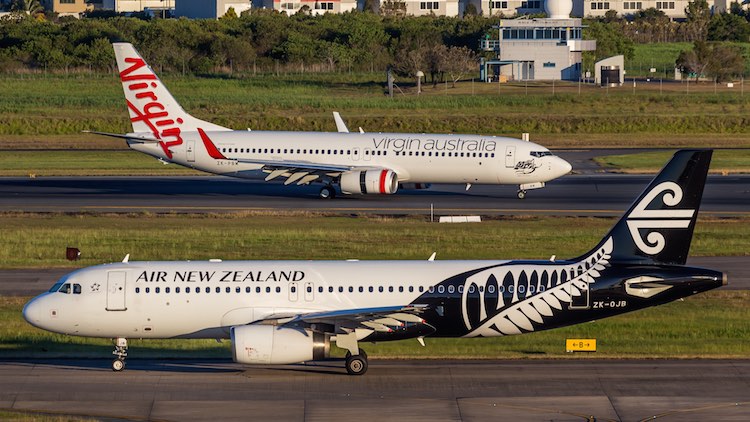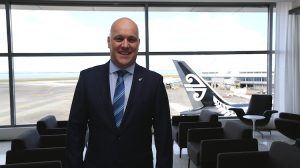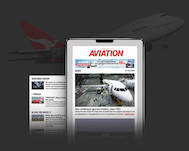
Air New Zealand’s decision to consider offloading its stake in Virgin Australia highlights the Kiwi carrier’s ambitions and the reduced reliance on its trans-Tasman partner, as well as hints at some divisions on the Australian carrier’s board, aviation analysts say.
The Kiwi carrier said on Wednesday it had engaged First NZ Capital and Credit Suisse to advise the airline on a review of its 26 per cent shareholding in Virgin, with options including a possible sale of all, or part, of its 26 per cent stake in Virgin.
Air NZ chairman Tony Carter said his airline’s review of its financial investment in Virgin would look at possible alternate uses of capital currently deployed in Virgin, adding his airline did not want to hold a large equity position in Virgin as it focused on its own growth opportunities.
While Air NZ’s public reason for looking to sell the shares is to focus on its own growth ambitions, Mint Asset Management senior investment analyst Greg Fraser said there could be other reasons at play.
“Luxon has headed for the emergency exit before the others, perhaps sensing that there isn’t much value in retaining the stake in VAH,” Fraser said in a research note on Wednesday afternoon.
“The excuse of finding alternative use for the capital is fair but not necessarily the real reason. Perhaps the original defensive support for VAH against QAN was justified but no longer.”
Further, Fraser said Air NZ was unlikely to lose much in the way of domestic connections with Virgin if it offloaded all, or part, of its shareholding in the Australia carrier.
The pair’s trans-Tasman alliance has been authorised by the Australian Competition and Consumer Commission until 2018. Air NZ has about 40 per cent market share in the Australia-New Zealand market, while Virgin has about 17 per cent.
So who might find Air NZ’s 26 per cent of Virgin, worth about $A347 million based on today’s share price, an attractive financial investment?
Well, it is hard to look past the three other major shareholders – Etihad, Singapore Airlines (SIA) and Sir Richard Branson’s UK-based Virgin Group – who already hold roughly 57 per cent of Virgin shares. However, any move from Etihad or SIA may require Foreign Investment Review Board approval.
Fraser says: “It’s pretty unclear who would take the parcel other than one of the other shareholders, and for what price? Until Air NZ can find a buyer for a reasonable price, this may simply be an overhang issue.”
Neil Hansford, the chairman of aviation consultancy Strategic Aviation Solutions also raised the prospect of a Chinese carrier swooping in to gain a stake in the Australian domestic market through Virgin.
Air NZ chief executive Christopher Luxon has also resigned as a Virgin director, effective immediately. He is the last of the chief executives of the major airline shareholders to relinquish their board seats, after Etihad’s James Hogan and SIA’s Goh Choon Phong stepped down in 2015 and were replaced with other senior executives from their respective airlines.

Hansford said Air NZ might feel SIA and Etihad were keen to take Virgin in a different direction.
“I think there is some tension among the shareholders in the future direction of Virgin,” Hansford said on Wednesday.
“This has got all the odour of shareholder discontent. Etihad or Singapore may well be wanting to take Virgin in a direction that Air NZ is uncomfortable with.”
Virgin’s balance sheet position has been in the spotlight in recent times, after the airline announced Air NZ, Etihad, SIA and the Virgin Group had agreed to provide a 12-months $A425 million loan to provide “additional flexibility in the short-term” as it conducted a capital structure review.
While Moody’s noted the loan and balance sheet review would be “credit positive”, the ratings agency also said Virgin’s debt ratios had not come down as it had expected.
Further, Virgin’s operating cash flow fell to $A10 million in the 2015/16 first half, compared with $A65 million in the prior corresponding period and the airline’s unrestricted cash balance dropped 24 per cent to $A544 million, “weakening the company’s liquidity and credit profiles”, Moody’s said.
“While Moody’s recognizes that Virgin Australia’s overall earnings are on a positive trajectory — supported by its transformation program and low fuel prices — the pace of improvement has been below Moody’s expectations,” Moody’s said.
“Moody’s points out that Virgin Australia’s B2 corporate family rating is predicated on the deleveraging of its business. However, since 2013, the airline has not reduced its debt/EBITDA (earnings before interest, tax, depreciation and amortisation) as quickly as Moody’s has expected.”
Analysts from some of the major investment houses have estimated Virgin needed a further $500 million in capital to further reduce debt and protect against the potential rise in fuel prices.
A director at investment advisory firm Hamilton Hindin Greene Grant Williamson said Air NZ was right to be looking at pursuing on its own growth path with the capital currently tied up in Virgin.
“It’s probably not a bad time to be reviewing that holding,” Williamson told the NZ Herald.
“I would much prefer them to focus on their own opportunities.”
Hansford said the potential use of the funds that would be gained from the sale of its Virgin shares included further growth in its international business, a war chest for the battle against an expanding Qantas-owned Jetstar in its home New Zealand market, or a third idea that has been previously floated at times over the history of Air NZ – operating domestic routes within Australia.
“The question is, do they see more benefit of coming in on the golden triangle of Brisbane, Sydney and Melbourne and competing in their own right,” Hansford said.
“If they think they can make more than what they are getting out of the Virgin alliance, if Virgin is underperforming, then it means they might think they can make more money on the triangle themselves.”
Air NZ said further announcements on the outcome of its review would be made “in due course”.

















Sam
says:Who would buy it though??
NJP
says:Patience is the key here – everyone wanted Alan Joyce shot at dawn because of the QF problems & he managed to turn things around. I’d guess SQ & EY have big plans & definitely the capital to make things happen. Tigerair in NZ to take on Propstar NZ??
Virgin to Hong Kong to link in with VS??
Liam
says:Does this mean that they will drop all code shares? That’s if they sell their share
Neil Hansford
says:In looking at who might be a buyer we also need to look at what United Airlines might do to ensure they get feed into their Sydney and Melbourne Hubs.. Air New Zealand have all the feed they need into the 6+ direct routes. Star Alliance needs someone to step in and do the heavy lifting against a Qantas that made more money in the last half than SQ, Etihad and ANZ combined. The Chinese carriers need a beach-head and this would be cheap! They don’t have the ability to do it themselves. Lets not forget foreigners can own 100% of an Australian domestic airline.
Definitely a smart bail out by ANZ and why wouldn’t they compete with QF/JQ in Australia whilst Qantas is restricting yields in NZ by its domestic services. $350m plus would be a nice war chest.
k lane
says:love to see Air NZ on main trunk AU domestic
Peter
says:I read elsewhere earlier today that the Chinese airlines may look at taking up the “slack” as it would help them greatly by providing access to the Australian Domestic market.
vhtae
says:Virgin Australia have too many aircraft types and this needs to be addressed, A streamlined Mainline and Regional fleet and they need to move quickly on that.